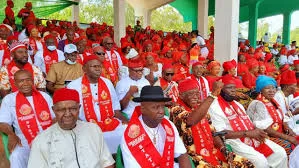
FIVE COUNTRIES OUTSIDE NIGERIA WHERE IGBO PEOPLE LIVE, SPEAK THEIR LANGUAGE
The Igbo people, one of Africa’s largest ethnic groups, originate from southeast Nigeria but have a presence far beyond their homeland.
Known for their vibrant culture and language, the Igbos have spread across various global locations due to historical movements and modern migration.
Here’s a look at five countries where the Igbo people live and their language continues to thrive outside Nigeria.
Jamaica
The history of the Igbo presence in Jamaica dates back to the time of the Atlantic slave trade. Many Igbos were transported to Jamaica and ended up influencing the local culture deeply. Today, remnants of the Igbo language can be seen in Jamaican Patois.
For instance, the term ‘red eboe’ in Jamaica refers to a fair-skinned black person, reflecting the historical descriptions of Igbos having a fair or yellowish skin tone.
Additionally, the Igbo word /unu/, meaning ‘you (plural)’, is still used in the local dialect, showcasing the linguistic influence that has endured through generations.
Cuba
In Cuba, the Igbo language has blended with other African linguistic influences to form a unique creolized version of the original tongues. Igbo, along with the Efik language, plays a role in the Afro-Cuban religious practices, particularly in the rituals of the Abakuá society.
These rituals often include linguistic elements and cultural practices that can be traced back to Igbo ancestry, showing the cultural amalgamation that has occurred over the centuries.
Cameroon and Equatorial Guinea
Close to Nigeria, Cameroon and Equatorial Guinea host significant Igbo populations. The proximity of these countries to the southeastern part of Nigeria makes them a natural migration spot for the Igbos.
In these countries, the Igbo language is part of the everyday vernacular for many, serving as a lingua franca for not only Igbos but also neighboring communities who have adopted various aspects of the Igbo culture.
Barbados
Similarly, in Barbados, the Igbo influence is quite noticeable. The island’s nickname ‘Bim’ is believed to have originated from the Igbo expression ‘bi mu’ (my people). This term has evolved into a colloquial name for the island, used affectionately by locals.
Such linguistic traces highlight the integration of the Igbo language into Barbadian culture, marking a significant imprint of Igbo heritage on the island.
 Premium News
Premium News